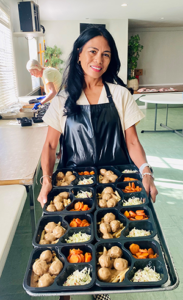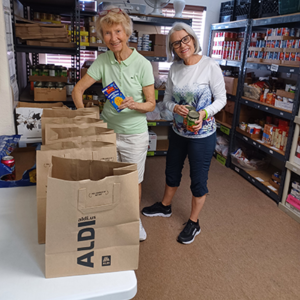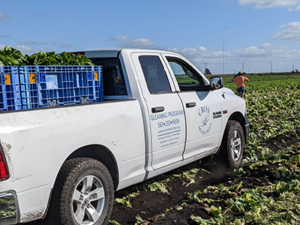What began as a group of local United Methodist Churches in 1978 forming Christians Reaching out to Society (CROS Ministries) to feed hungry people, has bloomed into a large scale, highly organized operation, serving over 111,000 people annually.
Do your little bit of good wherever you are. It’s those little bits of good that overwhelm the world. ~Archbishop Desmond Tutu
The mission of CROS is to serve the hungry in Palm Beach and Martin Counties through community collaborations. CROS which was began by one Reverend, Pam Cahoon, partners with people from different faith communities, including, the Christian, Jewish, and Muslim faiths, schools, businesses, civic groups, government entities, and local nonprofits.

When Reverend Pam retired after 35 years of service in 2014, Ms. Ruth Mageria, was recruited back from her home in Kenya to serve as Executive Director. She came with her then eleven year old son who is now a senior at the University of Central Florida and has been serving CROS for over 22 non-consecutive years.
When we asked Ms. Ruth Mageria what it is about this organization that drew her back, so far from her homeland, Ruth shared that it was about the community. She related the story of when she was gathering food with CROS volunteers.
“A couple of years ago, we were gleaning in the fields, collecting fresh fruits and vegetables that would otherwise go to waste.
 It was a Sunday morning. That morning we had several people in the gleaning field that were from a couple of Jewish temples in our community. We also had people from the Muslim Community of Palm Beach County, and others who had come individually. We were all in the field doing what we needed to do together, to ensure that our brothers and sisters who are hungry had food to eat. So when you think about our reach, I find that we have so much more in common than we are different. All of us are trying to figure out, ‘How can we do something to help those who are less fortunate in our community?’ ”
It was a Sunday morning. That morning we had several people in the gleaning field that were from a couple of Jewish temples in our community. We also had people from the Muslim Community of Palm Beach County, and others who had come individually. We were all in the field doing what we needed to do together, to ensure that our brothers and sisters who are hungry had food to eat. So when you think about our reach, I find that we have so much more in common than we are different. All of us are trying to figure out, ‘How can we do something to help those who are less fortunate in our community?’ ”
People often think of Palm Beach County as the playground of the rich, but in reality, over 200,000 of our residents are food insecure. The perception is often held that the people who need assistance are the indolent and perpetually unemployed, sitting around the house, not trying or wanting to work. But this is not the case for the vast majority of people who come to CROS for help.
 Many of the people receiving food assistance do have jobs. Some have two and three jobs, but the cost of living is much higher than their salaries can accommodate. “If you make $15 an hour, you are barely able to pay rent, which for a two bedroom apartment, could be as high as $1,200 to $1,500,” Ruth explained. “The cost of everything has gone up: gas, groceries, rent, mortgages, and insurance. So people don’t have enough money to pay all of their bills and buy food as well.”
Many of the people receiving food assistance do have jobs. Some have two and three jobs, but the cost of living is much higher than their salaries can accommodate. “If you make $15 an hour, you are barely able to pay rent, which for a two bedroom apartment, could be as high as $1,200 to $1,500,” Ruth explained. “The cost of everything has gone up: gas, groceries, rent, mortgages, and insurance. So people don’t have enough money to pay all of their bills and buy food as well.”
People are being forced to make the difficult decision of whether to pay rent or buy food. They have just enough to live on and then the car breaks down, and they have to spend money fixing their car so they can get to work.
“There are so many layers to food insecurity,” Ruth said. “Many have food to eat, but they don’t have enough food every day or enough quality food for a healthy diet. There are parents who are not eating so that their children can eat. Others may have food to eat, but it’s not regular meals every day or nutritious. Food is medicine. So we want to make sure that the food we are eating is good for you.”
 Ruth shared a story about a teacher in Boca.
Ruth shared a story about a teacher in Boca.
“One time, I needed to take some picture for our website, and so I went to one of our food pantries to take pictures. When we take pictures, we need a media release form to make sure each person agrees to being in the pictures with us.
I talked to one lady, and she said it was fine and signed a release form. It was Saturday morning in Greenacres. As she looked through my phone, she chose the picture where her face was covered. She told me that she was a teacher in a public school in Boca Raton. She had traveled from Boca to Greenacres for food where no one would know her. If she had gone to a pantry in Boca, she would see the parents and students that might recognize her. She was single and had children and was trying to pay rent.
On another occasion, a lady visited one of our pantries seeking food assistance. As I handed her a bag of food, she shared with me that in the past she was the volunteer and not the recipient. She had even organized a food drive at the company she had previously worked, now she was unemployed and embarrassed to be there. When she shared this with me, my heart broke for her, having a son of my own, I could empathize. I knew without hesitation that I would do whatever it took to feed my son.”
Many of these clients are very embarrassed to be on the receiving end of the donations, but they are there because they have children and others depending on them.
 The programs of CROS include six Palm Beach County food pantries – five pantries that are located in community partner buildings and one mobile “pop-up” pantry distributing, food at nine different sites; The Caring Kitchen, a hot meal and homebound meal delivery program; Gleaning, a produce recovery program; and advocacy for children.
The programs of CROS include six Palm Beach County food pantries – five pantries that are located in community partner buildings and one mobile “pop-up” pantry distributing, food at nine different sites; The Caring Kitchen, a hot meal and homebound meal delivery program; Gleaning, a produce recovery program; and advocacy for children.
After 22 years, Ms. Mageria is as passionate about serving the hungry in our community as she was two decades ago, when she started work at CROS. “I’m a big believer in the that fact that we have more in common than we are different, so we can all come together to do little small bits of good wherever we are and change the world. Someone that I’ve always looked up to is the late Archbishop of the Anglican Church of South Africa Desmond Tutu. He once said, ‘Do your little bit of good wherever you are. It’s those little bits of good that overwhelm the world.’ “





